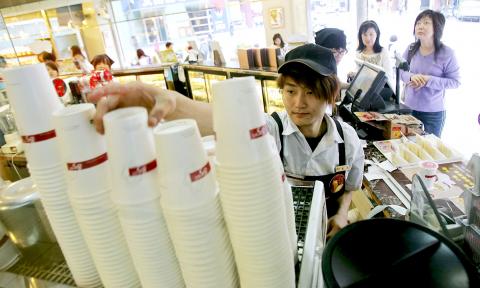Gourmet Master Co (美食達人), which operates the popular 85°C (85度C) bakery and coffee chain in Taiwan, China, Australia and the US, yesterday saw its shares surge 138 percent on its main bourse debut to NT$400, compared with the benchmark TAIEX’s 0.83 percent rise.
The much-touted initial public offering (IPO) was oversubscribed 200 times by the public, with each application standing only slightly over a 1 percent chance of landing stock.
In a move to fund overseas expansion by opening 100 more outlets in China next year, Gourmet Master issued 3.85 million shares for its IPO, with one share set at NT$168.

PHOTO: MAURICE TSAI, BLOOMBERG
“Investors are pinning hopes on the company’s expansion into the Chinese market,” Grand Cathay Investment Services Corp (大華投顧) chairman Tu Jin-lung (杜金龍) said. “People believe in these China leads and they are eager to jump on the bandwagon.”
Gourmet Master president and general manager Wu Cheng-hsueh (吳政學) said on Thursday last week that the company would have 170 85°C outlets in China by the end of this year. The firm aims to expand to more Chinese cities and have a total of 1,000 stores by 2016, he said.
The Chinese business produced 43 percent of Gourmet Master’s total revenue last year. The percentage is expected to rise to 57 percent this year and further to 68 percent next year, Macquarie Equities Research said in a report on Wednesday last week.
“Gourmet Master has established a strong foothold in the most prosperous eastern China region. We expect significant earnings growth, as Chinese consumption of bakery products and coffee is set to grow,” Macquarie said.
It gave Gourmet Master an “outperform” rating with a target price of NT$300.
Judging from the significant gains in the share price, Taiwan International Securities Corp (金鼎證券) analyst Michael Chiang said he suspected buying largely came from institutional investors.
“Today’s closing price was much higher than the range of NT$250 to NT$300 anticipated by the market,” Chiang said. “I’m guessing institutional investors, including foreign investors, served as the major force pushing up the share price.”
Chiang predicted that -institutional investors would likely continue to hold the stock because of their upbeat outlook over the company’s bottom line.
“The price tag of NT$400 is by no means a ceiling for the stock in the near term,” he said.
Gourmet Master posted NT$758 million (US$25 million) in net -income, or NT$5.80 earnings per share (EPS) this year, up about 130 percent from 2008. Macquarie predicted the company’s EPS would hit NT$6.92 this year and NT$9.91 next year.
Gourmet Master’s initial share sale is the second-largest on the local bourse so far this year, -second only to the NT$6.2 billion raised by TPK Holding Co (宸鴻) last month. TPK’s share price also more than doubled on its first day of trading in Taipei and rose 3.9 percent to NT$566 yesterday, compared with its IPO price of NT$220.
“The enthusiastic response the new stocks received from the Taiwanese market should lure more foreign companies to trade on the local bourse,” Yuanta Securities Co (元大證券) investment and corporate banking chief Sam Lee (李明山) said.
Yuanta was the underwriter for both Gourmet Master and TPK.

Sweeping policy changes under US Secretary of Health and Human Services Robert F. Kennedy Jr are having a chilling effect on vaccine makers as anti-vaccine rhetoric has turned into concrete changes in inoculation schedules and recommendations, investors and executives said. The administration of US President Donald Trump has in the past year upended vaccine recommendations, with the country last month ending its longstanding guidance that all children receive inoculations against flu, hepatitis A and other diseases. The unprecedented changes have led to diminished vaccine usage, hurt the investment case for some biotechs, and created a drag that would likely dent revenues and

Macronix International Co (旺宏), the world’s biggest NOR flash memory supplier, yesterday said it would spend NT$22 billion (US$699.1 million) on capacity expansion this year to increase its production of mid-to-low-density memory chips as the world’s major memorychip suppliers are phasing out the market. The company said its planned capital expenditures are about 11 times higher than the NT$1.8 billion it spent on new facilities and equipment last year. A majority of this year’s outlay would be allocated to step up capacity of multi-level cell (MLC) NAND flash memory chips, which are used in embedded multimedia cards (eMMC), a managed

CULPRITS: Factors that affected the slip included falling global crude oil prices, wait-and-see consumer attitudes due to US tariffs and a different Lunar New Year holiday schedule Taiwan’s retail sales ended a nine-year growth streak last year, slipping 0.2 percent from a year earlier as uncertainty over US tariff policies affected demand for durable goods, data released on Friday by the Ministry of Economic Affairs showed. Last year’s retail sales totaled NT$4.84 trillion (US$153.27 billion), down about NT$9.5 billion, or 0.2 percent, from 2024. Despite the decline, the figure was still the second-highest annual sales total on record. Ministry statistics department deputy head Chen Yu-fang (陳玉芳) said sales of cars, motorcycles and related products, which accounted for 17.4 percent of total retail rales last year, fell NT$68.1 billion, or

In the wake of strong global demand for AI applications, Taiwan’s export-oriented economy accelerated with the composite index of economic indicators flashing the first “red” light in December for one year, indicating the economy is in booming mode, the National Development Council (NDC) said yesterday. Moreover, the index of leading indicators, which gauges the potential state of the economy over the next six months, also moved higher in December amid growing optimism over the outlook, the NDC said. In December, the index of economic indicators rose one point from a month earlier to 38, at the lower end of the “red” light.